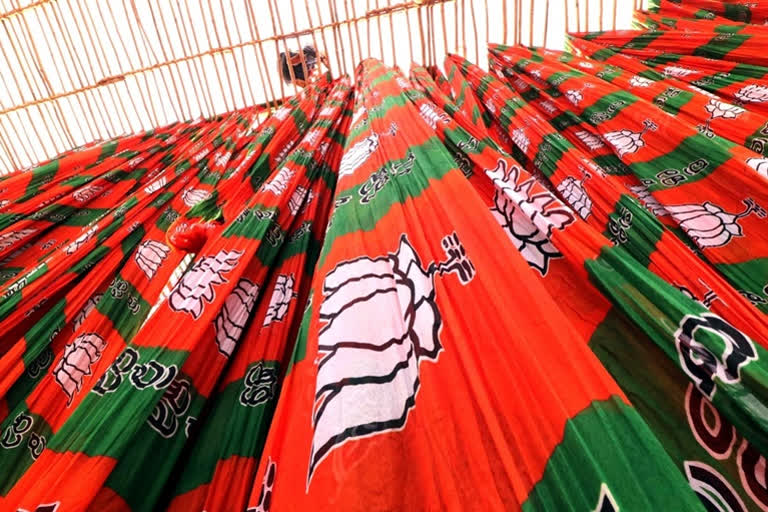New Delhi: The four out of five state poll wins may have given a leg up to the Bharatiya Janata Party (BJP) but the Presidential polls in July may not be a cakewalk for the party ruling the Centre. The reason is the BJP’s reduced number of lawmakers in the four states as compared to 2017 and the fact that several regional parties are opposed to it. The electoral college for the Presidential polls consists of Members of Parliament (both Rajya Sabha and Lok Sabha) and the Members of Legislative Assemblies in the states.
The total strength of MPs comes to 776 (RS 233 and LS 543) and each MP’s vote has a value of 708. The NDA has a majority in the Lok Sabha with BJP 301 and ally JD-U 16 MPs. The Congress has 53, TMC 22, DMK 24, Shiv Sena 19, NCP 5, YSRCP 22 and TRS 9 members. In the Rajya Sabha, the BJP is the single largest party with 97 members while JD-U has 4. The Congress has 33, TMC 13, DMK 10, CPM 6, NCP 4, RJD 5, SP 5, Shiv Sena 3, TRS 6 and YSRCP 6 members.
Further, over 70 Rajya Sabha seats will fall vacant over the next few months, including 11 in Uttar Pradesh and one in Uttarakhand, where the BJP would have an edge. However, in Punjab, where seven Rajya Sabha seats will fall vacant, the ruling AAP is expected to win six, which will increase its tally in the upper house of Parliament from three at present to nine. In the case of MLAs, totalling 4,120 across the country, the value of their vote changes from state to state depending upon the population, calculated as per the 1971 Census.
Out of the five states that went to the polls this year, the NDA seats came down in Uttar Pradesh from 323/403 in 2017 to 273 in 2022. The BJP had 312 MLAs in UP while its ally Apna Dal (Sonelal) had 11 lawmakers in 2017. The numbers came down in 2022 with BJP 255 MLAs and allies Apna Dal(S) and Nirbal Indian Shoshit Hamara Aam Dal getting six lawmakers each. The differential between the NDA tally in UP comes to around 50 seats and is crucial as the value of an MLA’s vote in the electoral college for the Presidential polls is the highest at 208. This means a reduction of 10,400 votes for the high-stakes election.
Similarly, in Uttarakhand, the BJP’s tally came down from 56 to 47, a loss of 9 votes. Given the value of an MLA vote in Uttarakhand is 64, the BJP has to deal with a reduction of 576 votes for the Presidential poll. In Goa, the NDA tally dropped from 28 to 20 with old ally Maharashtrawadi Gomantak Party having two seats supporting the saffron party from outside. Given the value of one MLA vote as 20, the reduction comes to 160 votes. In Manipur, the NDA was reduced from 36 MLAs to 32. This means a reduction of 72 votes for the Presidential polls. In Punjab, the BJP has maintained the count of two seats it got in 2017.
Opposition in states
The BJP is expected to face resistance from Shiv Sena in Maharashtra, Trinamool Congress in West Bengal, DMK in Tamil Nadu, Telangana Rashtra Samithi in Telangana and Aam Aadmi Party in Delhi and Punjab. TMC president and West Bengal chief minister Mamata Banerjee has already challenged the BJP saying the saffron party can’t ignore her as it had less than 50 per cent votes needed to win the Presidential polls.
Hence, the BJP managers will have to depend on allies like the YSRCP in Andhra Pradesh and the BJD in Odisha to secure a majority in the Presidential polls. The winner of the Presidential election is not the person who gets the most votes but the person who gets more votes above a certain quota that is determined by dividing the sum of total valid votes polled by 2 and adding one to the quotient.
Presidential nominee
Ram Nath Kovind, who was Bihar Governor in 2017, had defeated the opposition candidate Meira Kumar by getting around two-thirds of the votes to become the President of India. The name of Vice-President Venkaiah Naidu has been floating around as the NDA nominee for the 2022 contest and the BJP may also give a second chance to President Kovind but the top leadership is yet to take a final call on the matter. The Congress, which pushed the candidature of former Lok Sabha Speaker Meira Kumar as the opposition nominee in 2017, has been weakened after the series of electoral losses and may have to concur with the views of regional parties like the DMK, TRS, AAP and TMC.



